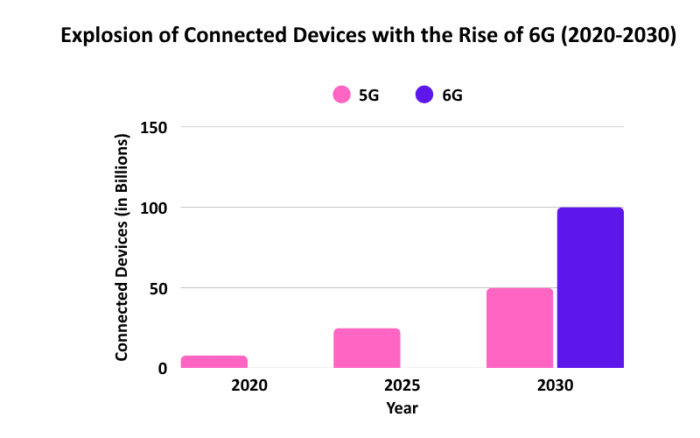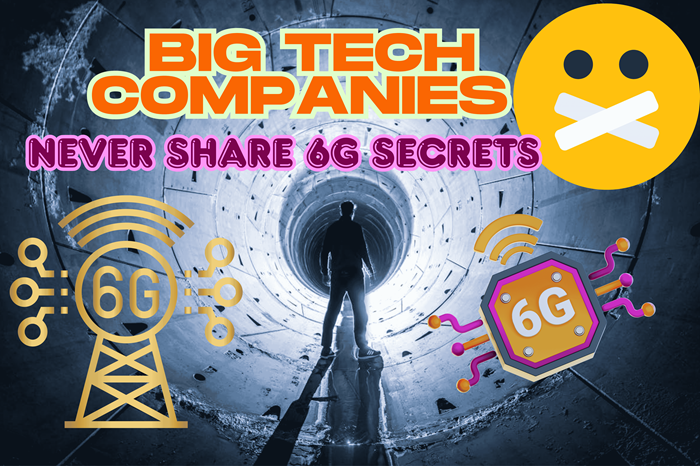Big-tech is investing billions in 6G, but still keeping the full picture behind closed doors.
What are they not telling us? And more importantly—how does 6G affect your life, business, and future?
Firstly, what is 6G?
6G refers to the sixth generation of wireless communication technology and it is expected to launch commercially around 2030. Although, the early development is already happening in 2025. It is projected to offer the following in comparison to 5G
- Speeds in 6G upto 100x faster than 5G
- Ultra-low latency (under 1 millisecond)
- Real-time holograms, tactile internet, and full AR/VR integration
- Massive AI-driven automation and edge computing
It sounds exciting but here is what big-tech isn’t shouting from the rooftops.
1. Your Data will be more Valuable than Ever
Big-tech thrives on data—and 6G will be a data goldmine. In 6G, billions of devices from your watch to your refrigerator will be connected. Infact, 6G will create a real-time data ecosystem, consisted of tracking your movements, behaviors, preferences and even the biometric information.

But why it matters?
Companies are leveraging advanced personalization data to influence everything from targeted advertising to strategic pricing. However, users are not fully realizing how much personal information they are handing over. In a nutshell, data privacy in 6G will become a survival skill.
2. It’s not just about Faster Speeds—It’s about Control.
Big-tech hypes up speed. But what they are building is actually the infrastructure for control; like the 6G-powered smart cities, AI-enhanced surveillance, and real-time monitoring. Consequently, this could help tech companies and governments to know where you are, what you are doing, and who you are with—at all times.
Concern: Who is writing the rules for this ultra-connected world? And who watches the watchers?
3. 6G will reshape Jobs—But not in the way you think
We have all heard that automation is coming. But with 6G, it won’t just affect factory workers— it will affect white-collar jobs too.
AI-powered systems along with the 6G speed will diagnose patients, write reports, design products, or even code in real time. Consequently, this will provide huge productivity gains, innovation, and convenience. Certainly, a massive shift in the job market, especially for middle-skilled roles is expected.
4. Big-Tech is quietly Buying up the Future
Indeed, major tech companies like Apple, Google, Huawei, and Samsung are aggressively acquiring patents, securing satellite bandwidth, and investing in AI startups to dominate the future of innovation. Moreover; 6G is not just about smartphones, it is about owning the ecosystem. Whoever controls the infrastructure—surely controls the data, the apps, the platforms, and the revenue.
5. 6G Isn’t Green Yet
Big-tech loves to talk about sustainability. 6G will require exponentially more energy than 5G, especially to support millions of small-cell base stations and AI-driven cloud processing. Although, the solutions like edge computing and low-power chips are in development but the environmental impact is underplayed.
Until these innovations are mainstream, the 6G rollout could increase carbon footprints, especially in the developing nations. Nevertheless, you can back some control like;
- Always stay informed and read beyond the headlines.
- Use VPNs to protect your data, and understand the application permissions.
- Ask better questions to policymakers, companies, and to your network.
- Learn tech-adjacent skills and reskill early that won’t be easily replaced by automation.
- Back startups and policies focused on transparency, security, and sustainability to support ethical innovation.
Final Thoughts: About Awareness
6G has the potential to revolutionize the way we live, work, and connect. Notably, big-tech is not necessarily evil—but their silence on certain 6G implications could make us all curious.



